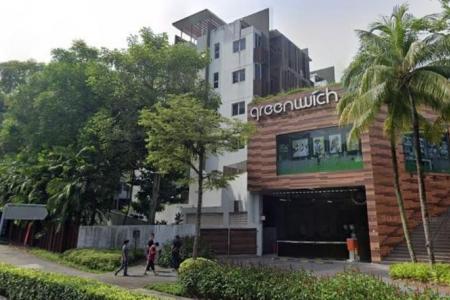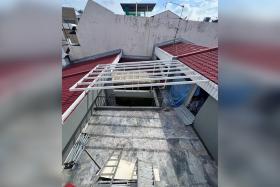Condo owner’s complaint over noise from water pump dismissed by tribunal board
A condominium resident who complained about the noise from a pump that operates a water feature in the Seletar estate has failed in a legal bid to have the pump system turned off.
Ms Liu Xiaoyu had filed an application to the Strata Titles Board, asking it to order the management corporation strata title (MCST) of The Greenwich condo to “switch off the noisy fountain pump immediately”.
In a decision published on Nov 21, the board dismissed her application, saying she failed to prove that the noise she complained about was caused solely by the pump.
Ms Liu, who represented herself, had submitted an expert report which stated that the noise level in her ground-floor unit exceeded the World Health Organisation (WHO) guidelines for community noise in specific environments.
The board noted that the report indicated that there were other noise sources apart from the pump and the water feature, including human and vehicular traffic, and noise from the Greenwich V shopping mall that is next to her unit.
The board also noted that Ms Liu conceded under cross-examination that the noise from the mall’s carpark caused it to be noisier in her bedroom than on her balcony, which was next to the pump.
She submitted an audio recording of the alleged noise, but conceded that it contained only the sound of water, which was what attracted her to purchase the unit in the first place.
There are currently no guidelines by the National Environment Agency (NEA) governing the noise limits for water pumps or features in residential areas.
The MCST, represented by Mr Daniel Chen and Mr Drashy Trivedi from Lee & Lee, submitted an expert report stating that the sound level fell within the NEA guideline on boundary noise emission limits for air-conditioning and mechanical ventilation systems in non-industrial buildings.
During the hearing, the MCST’s expert demonstrated that the WHO guidelines of no more than 30 weighted decibels, or dbA, inside bedrooms were impossible to achieve in Singapore.
A brief sound recording, taken while the room was silent, registered 44.7 weighted decibels.
The board said this suggests that WHO guidelines “may not be practicable in a highly urbanised city-state like Singapore”.
It also noted that the urban sound guidelines in Britain and the United States have prescribed levels that exceed those prescribed by the WHO.
“The applicant has not shown on a balance of probabilities that the noise levels of the fountain pump were objectively undesirable in the circumstances of the present case,” said the board.
Ms Liu, who lives with her elderly parents, bought the unit through a resale transaction on May 31, 2021.
The family used to live in an HDB flat in Yishun, but she said she decided to move to a condo to provide a “more peaceful environment” for her retired parents.
She decided to buy the unit, which was next to the swimming pool, as she felt that the sound of water had a calming effect.
In July 2021, shortly after moving in, Ms Liu and her parents raised noise complaints to the then condominium manager.
She said the noise emanated from a water feature, which has water flowing down from the top of a wall into a feature pool. The wall faces away from her unit, and the pump is submerged under a grating in the feature pool.
The MCST argued that Ms Liu had bought the unit with her eyes wide open, as she had seen the water feature multiple times before the purchase.
It also noted that it did not receive complaints from the previous owners of the unit, who had lived there for more than six years.
In its decision, the board observed that tolerance levels for noise are subjective and that what may be acceptable to some may be intolerable to others.
However, it said it had to decide on issues of noise from a principled and objective basis.
The board added that it sympathised with Ms Liu’s case and hoped for an amicable outcome for her family.
Get The New Paper on your phone with the free TNP app. Download from the Apple App Store or Google Play Store now


